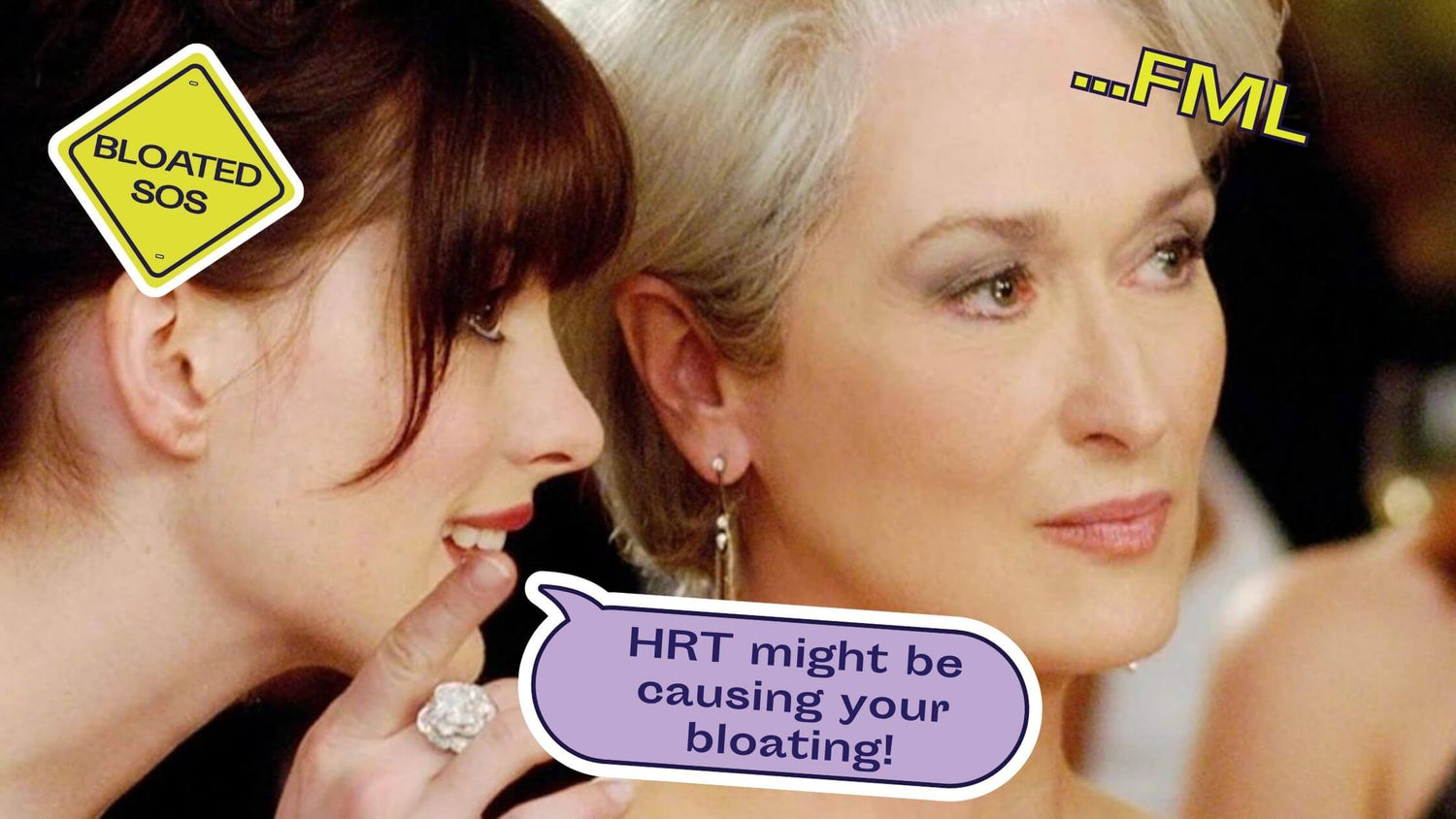Hormone replacement therapy, known in short as HRT, is often given to women going through menopause to reduce the associated side effects. It replaces the female reproductive hormones (mainly oestrogen and progesterone) that naturally decline during the process of menopause until they eventually become non-existent in the body.
Dropping levels of oestrogen and progesterone lead to a number of negative symptoms, including hot flashes, fatigue, dizziness, headaches, mood changes, and vaginal dryness. HRT can reduce the severity of these symptoms to make the transition into menopause easier for women.
Despite being effective at tackling the symptoms of menopause, hormone replacement therapy can lead to bloating. However, there are lots of effective strategies that can be used to quickly reduce bloating caused by HRT, including dietary, supplementary, and lifestyle adjustments.
What is HRT?
HRT stands for hormone replacement therapy, and it is a widely used and well-researched form of treatment for menopause. It may also be used in males to supplement endogenous testosterone production, and this is known as testosterone replacement therapy (TRT).
HRT can alleviate the symptoms associated with low levels of reproductive hormones. During menopause, oestrogen and progesterone production declines and eventually stops, marking the end of a woman’s reproductive years. Males may experience low testosterone due to excessive steroid use, testicular injury, chemotherapy, or alcohol and drug misuse.
Hormone replacement therapy is often provided long-term for post-menopausal women. It may comprise oestrogen and progesterone in combination or separately to alleviate the symptoms associated with menopause, such as hot flashes, night sweats, vaginal dryness, and mood swings.
Some women may be offered oestrogen replacement after a hysterectomy and salpingo-oopherectomy (removal of the uterus and ovaries), as the ovaries are the primary producers of oestrogen. Once they are removed, the body can no longer produce oestrogen endogenously, so HRT provides exogenous oestrogen replacement.
In men, a lack of testosterone can cause fatigue, decreased libido, muscle weakness or muscle loss, and erectile dysfunction. TRT can alleviate these symptoms by replacing the body’s lack of endogenous testosterone.
Female HRT may be administered orally (via tablets or capsules), vaginally (via pessaries or vaginal rings), or transdermally (via creams, gels, or patches). The dosage may vary depending on each woman’s unique needs and physiology.
How Does HRT Cause Bloating?
Menopausal bloating is extremely common, and it can be uncomfortable or even painful to deal with. Not only does it cause physical discomfort, but it can also negatively impact a woman’s self-perception and confidence.
Bloating causes swelling or distention in the abdomen, a feeling of fullness in the lower abdomen, excess burping or flatulence, and swollen legs and feet (peripheral oedema). Women might experience these symptoms when they begin HRT due to the fluid-retaining effects of progesterone.
Women can experience hormonal bloating throughout their reproductive years due to endogenous oestrogen and progesterone production. However, even when a woman’s menstrual cycle stops following menopause, she may still experience bloating if she commences HRT.
Bloating can occur for a number of reasons, including dietary factors, a sedentary lifestyle, and pre-existing health conditions (particularly those that impact the digestive system). So, post-menopausal women might experience bloating due to these reasons and not necessarily due to HRT. However, HRT is known to cause bloating or exacerbate it.
How Can I Stop Bloating From HRT?
Thankfully, HRT-related bloating tends to be transient and can disappear within a few months of starting the treatment. However, if you’re currently dealing with hormonal water retention whilst on HRT and want to alleviate your bloating quickly, try the following strategies.
Take a daily probiotic supplement
Probiotics refer to various species of bacteria, including Lactobacillus, Bifidobacterium, Enterococcus, and Streptococcus.
These bacterial species are beneficial for humans and are found naturally in the colon (the gut). They aid vitamin K and B12 production, promote better metabolism and digestion, and perform some immune functions. Although you already have millions of these probiotic bacteria inside your body, you can boost your numbers by taking a daily probiotic supplement.
Since probiotics can promote better digestion and metabolism, they can relieve digestive symptoms like bloating, excess gas, abdominal cramps, and constipation. Our probiotic supplement, A Dose For Bloating, contains one million probiotic bacteria, the optimal amount for tackling menopausal bloating.
Take digestive enzymes when needed
If you’re having a particularly bad day with your digestion, you can add a digestive enzyme supplement to your daily routine alongside your probiotic. A Dose For Bloating contains six different digestive enzymes for maximum bloat-busting effects.
As with probiotic bacteria, digestive enzymes are found naturally in the body. They are produced by your stomach and pancreas in response to ingested food, and help to breakdown these foods into absorbable nutrients.
If you’re lacking in digestive enzymes or feel that your hormonal bloating is out of control following menopause, taking a daily digestive enzyme supplement will help to tackle your symptoms.
Consume natural laxatives
Many foods have natural laxative properties and can help to keep things moving down below to prevent bloating and gas. Foods that can help you have a bowel movement include:
- Apples
- Artichokes
- Avocados
- Beans
- Chia seeds
- Figs
- Flaxseeds
- Kiwi
- Pears
- Prunes
- Sweet potatoes
Consuming more of these foods can promote better digestion and prevent a back-up in your colon, causing bloating and discomfort. Find new and exciting recipes that incorporate these ingredients and get creative in the kitchen!
Exercise Daily
Regular exercise can help to reduce menopausal bloating and water retention (especially in the lower body) by improving blood flow and circulation around the torso and peripheries. Aim for at least 30 minutes of moderate-intensity exercise on around five days of the week to a total of 150 minutes.
Try a few different forms of exercise if you’re not sure which type of movement is the best for you. Consider walking, jogging, cycling, swimming, dancing, or weight lifting. There are so many different ways to move your body, so don’t be afraid to try something new.
Stay Hydrated
Drinking enough water can help to hydrate you and flush out excess sodium and fluids from the body, reducing water retention and bloating. Ideally, you should drink enough to avoid getting thirsty in the first place.
Keep a water bottle by your side throughout the day, whether you’re at home, work, a social event, or the gym. At the same time, limit your intake of caffeine and alcohol, both of which can cause you to become dehydrated and worsen menopausal bloating.
Limit Your Salt Intake
High sodium intake can lead to hypernatraemia, the symptoms of which include water retention and bloating. Consuming too much dietary salt can cause your kidneys to reabsorb more water. The recommended amount of salt is no more than six grams per day.
If you’re trying to reduce your salt intake, try and limit consumption of salty foods, such as processed meats, canned soups, ready meals, and packaged snacks. Instead, choose low sodium options and avoid adding salt during and after cooking, and use alternative seasonings, such as herbs and spices.
Eat Smaller, More Frequent Meals
Consuming large meals can make it difficult for the digestive system to cope with breaking down and absorbing food. Instead of consuming a large volume of food in one sitting, try splitting your meals into smaller portions and spreading them throughout the day.
Incorporate more snacks into your day to ensure you consume enough calories. Ideally, eat your last meal a few hours before you go to bed to allow your digestive system time to metabolise the foods you’ve eaten and prevent heartburn and bloating.
Manage Your Stress
As stressful as menopause may be, it’s important to try and manage your stress as much as possible during this significant milestone in your life. Stress can exacerbate menopausal symptoms, including bloating, abdominal pain, hot flashes, and headaches.
Consider stress management techniques like deep breathing, meditation, yoga, or gentle stretching. Regular exercise can also act as a natural stress reliever, provided it’s a form of exercise you enjoy and don’t overdo it.
Consider Trying Herbal Remedies
Certain herbal remedies and supplements may help to relieve hormonal bloating and other symptoms associated with menopause. Consider drinking herbal teas, such as those that contain ginger, fennel, peppermint, chamomile, or lemon. You might also want a herbal-based supplement to further support your digestive system.
Avoid Carbonated Drinks
Carbonated drinks like soda, sparkling water, and beer can contribute to bloating by increasing the amount of gas in your digestive system. Avoiding carbonated drinks can help to prevent bloating whilst you’re going through menopause and long after it. Instead, choose still water, fruit juice, coffee, and herbal teas.









